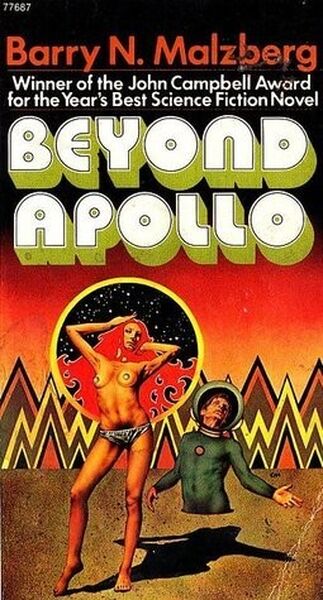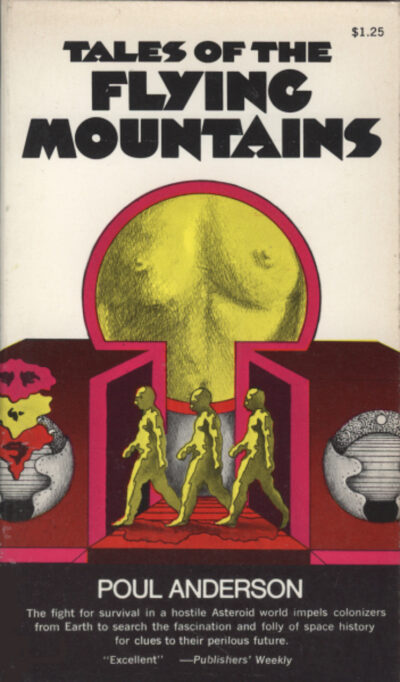Why Didn’t They Ask Evans?
Beyond Apollo
By Barry N. Malzberg

10 Aug, 2025
Barry N. Malzberg’s 1972 Campbell-Award-winner Beyond Apollo is a stand-alone New Wave science fiction novel.
Two Americans set out for Venus. One man, Harry M. Evans, returned. The authorities would very much like to know what happened to Evans’ captain. Evans is not unwilling to be forthcoming. Evans is all too forthcoming.
The end of the Apollo program presented NASA with a challenge. What program would offer NASA the means to consume more funding, thus preserving NASA? The answer was obvious: conquer Mars!
The Martian expedition was an abject failure; few are willing to discuss it openly. NASA then selected a more modest goal. Send a two-man crew to Venus. Step one: winnow down a vast pool of applicants to just two, Evans and his captain. Step two: send them to Venus. Step three: in the wake of glorious success, apply for more funding.
The Venus expedition went better than the Martian effort, in the sense that there was a survivor. It did not go well. The captain is missing, certainly dead. Murder? Suicide? A passing chrono-synclastic infundibulum?
Evans provides an explanation. Evans provides many explanations. Evans provides contradictory explanations. Some border on the fantastical. Others are clearly pure pulp SF nonsense. Is one correct? Are any of them correct? As Evans is clearly mad as a march hare, it is unlikely NASA will ever know.
~oOo~
About the cover. Many SF publishers in the 1970s and 1980s felt strongly that the readership, being largely young men for whom any hope of a sex life was futile1, slapped naked or semi naked women on covers regardless of whether there were any actual naked or semi naked women in the book itself2. Poul Anderson’s relentlessly dreary Tales of the Flying Mountains is a fine example.

Does that say “libertarian asteroid mining” to you?
This is not what’s going on with Charles Moll’s cover for Beyond Apollo. Evans enjoys… enjoys may be an overstatement… experiences a neurotic, joyless, excessively judgemental sex life with his wife. Evans appears to fall into the Robert Crumb school of eroticism, obsessed with sex without much liking women in general or his wife in particular. Mrs. Evans can definitely do better than Evans. Happily, she eventually realizes this.
While Evans’ account is short on verifiable facts, one fact that can be verified is that Evans is quite mad. Therefore, the reader is provided with a rambling (although short by modern standards), contradictory, word-play-filled account of what happened on the way to Venus. Nothing can be taken at face value, not even the captain’s name3.
There is one point not undermined by Evans’ madness, which is the novel’s assertion that NASA is above all else a bureaucracy whose primary goal is to preserve itself. Therefore, glorious space missions will be undertaken, whether or not those missions serve any useful purpose or have a reasonable chance of succeeding.
I don’t know if Malzberg was aware of this or not, but NASA did indeed include in its post-Apollo programs a plan to send astronauts past Venus. They didn’t intend to land the astronauts because they would have died on route to the surface4. Not that the astronauts would have had the chance to land on Venus, as the mission would have encountered a coronal mass discharge on route to Venus and everyone on board would have died quite unpleasantly.
Did teenaged James enjoy this novel, filled as it is with premature anti-NASA-ism, absurd orbital dynamics, gloomy sex, a protagonist who makes Holden Caulfield look like a font of effervescent joy, and a narrative that is pure quill nonsense? He did not. Adult James doesn’t mind having reread this novel, although clearly, it’s not my thing.
Beyond Apollo wasn’t just New Wave. It was the New Wave novel that won the very first John W. Campbell, Jr. Memorial Award for Best Science Fiction Novel5, beating out James Gunn’s rather pedestrian The Listeners, and Christopher Priest’s Fugue for a Darkening Island6. As people pointed out at the time, it is hard to imagine a novel Campbell would have been less likely to purchase7.
That being so, I expected to find spectacularly irate fulminations by Old Guard luminaries denouncing Beyond Apollo for rampant literariness and premature anti-NASA-ism. That does not appear to have been the case. Reviewers like Russ and Barbour praised Beyond Apollo. Geiss called it a fuck-the-reader novel but not in a particularly hostile way. Even Analog’s Miller called it “a strange book, that grows more fascinating the further you go.” The most hostile review I managed to track down was Shaw’s, but even there, he admits Malzberg’s craft in writing something Shaw thought was completely wrong-minded and bad for SF.
What appears to have happened or rather, not to have happened, are reviews by the Old Guard’s thinnest-skinned reviewers. In particular, Lester del Rey didn’t take over Analog’s Reference Library until 19758, too late for Beyond Apollo.
In any case, you don’t have to rely on reviews to form an opinion of this novel. You can read it for yourself!
Beyond Apollo is available here (Anti-Oedipus Press), here (Barnes & Noble), here (Bookshop US), here (Bookshop UK), here (Chapters-Indigo), and here (Words Worth Books).
1: Despite the 1970s being a golden age when women’s standards were very low and all a man needed was a pulse, overconfidence, and courageous grooming choices.
2: I will be returning to this theme on Tuesday or possibly Thursday.
3: Thus, denying me the opportunity to complain about the rocket science. Much of what Evans says is twaddle but as he is completely bonkers, he is clearly not someone to whom one should turn for edification.
4: Also, a return mission would have been impossible, not that that would have mattered.
5: Which is a different award from the John W. Campbell Award for Best New Writer. Neither Campbell Award is a Hugo. Campbell himself was not a Hugo. He was a John. The John W. Campbell Award for Best New Writer was renamed the Astounding, while the John W. Campbell, Jr. Memorial Award for Best Science Fiction Novel appears to be defunct. Sic transit and all that jazz. Also, USA delenda est.
6: The Priest book is about a British civil war triggered by the arrival of a vast number of African refugees, which seems like the sort of novel that can only have aged well.
It turns out I still own a copy of the Manor Books mass-market paperback. Gosh.
7: Campbell might have liked the critique of government functionaries.
8: Until I looked at the ISFDB entry for the Reference Library, I had not fully grasped how long P. Schuyler Miller’s tenure lasted: from October 1951 to January 1975. As far as I can tell, his reviews were never collected.
